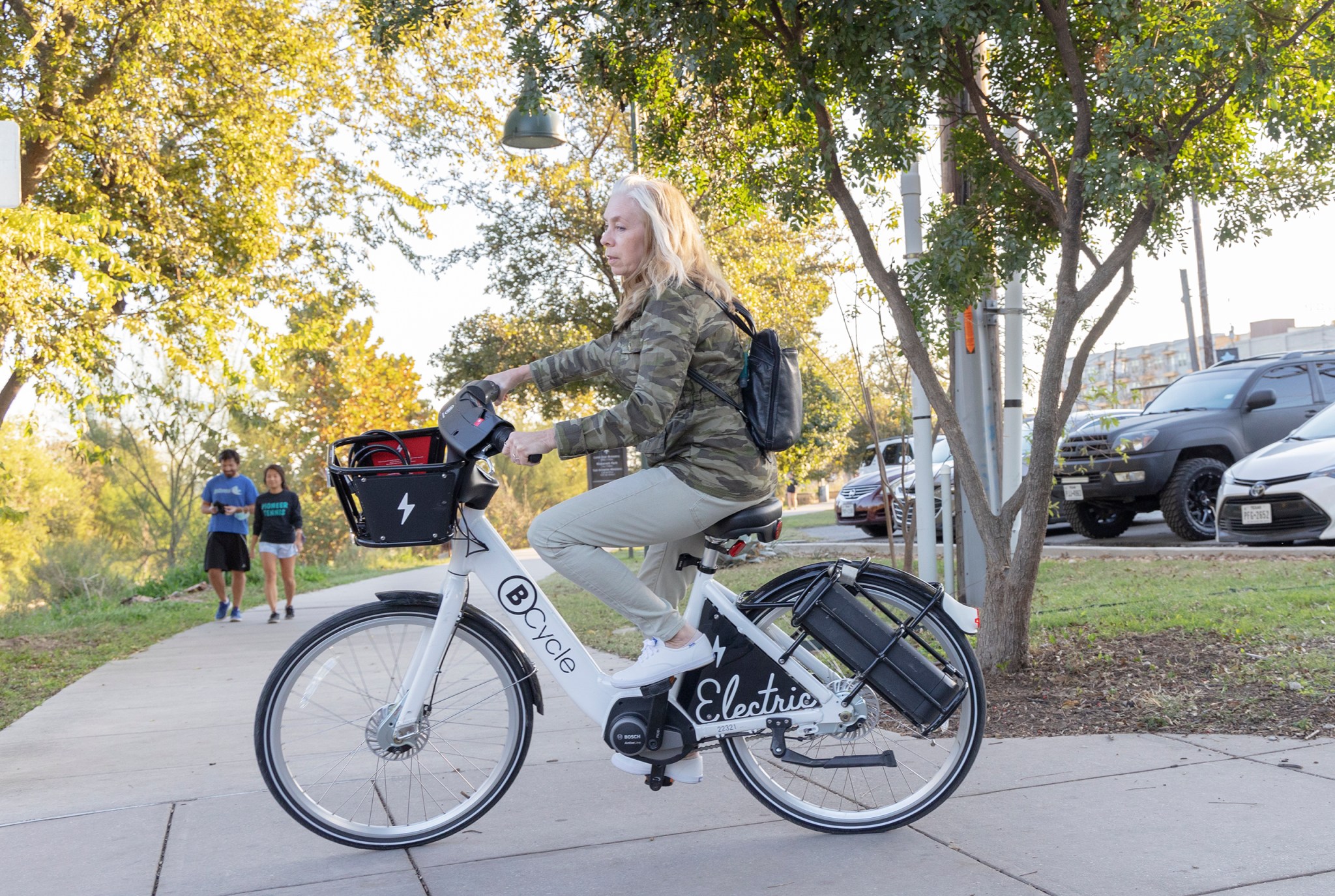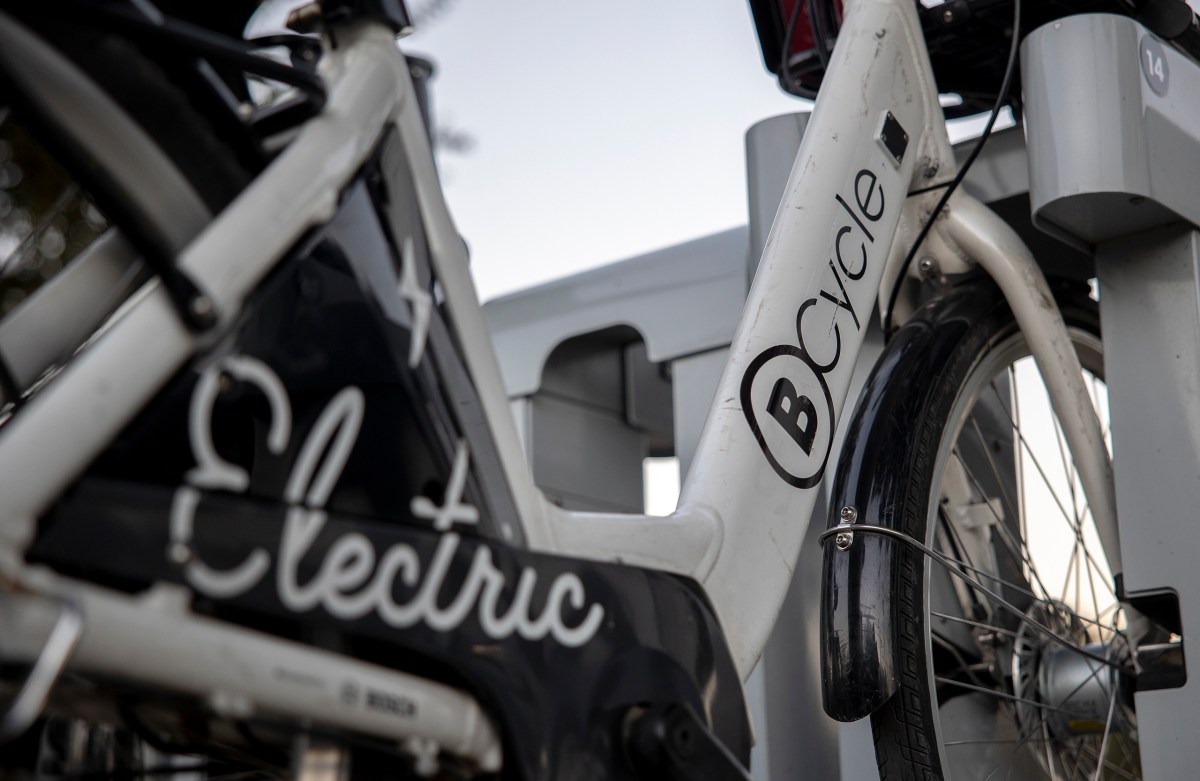by
Brendan Gibbons - San Antonio Report | Nov 21, 2021

Photo credit: Bria Woods / San Antonio Report
San Antonio’s bike-share company is fully electrifying its fleet, a sign of a growing global trend toward e-bike riding.
By the end of November, BCycle, which has operated the city’s only bike-share fleet for a decade, will have converted its entire fleet of roughly 300 bikes to pedal-assist bikes that give riders a boost from a battery-powered motor.
“We’re seeing it, really, across the entire cycling industry,” J.D. Simpson, BCycle general manager, said of the growth of e-bikes worldwide.
San Antonio is one of many large U.S. cities that have seen e-bikes displacing non-motorized bikes in its bike-share program. A June NBC News analysis of bike-share data from 13 major cities found e-bike use spiked in nearly all of them during the first half of 2021.
Jeff Moore, a local cycling advocate and organizer with SATX Social Ride, said he’s a “huge fan of the electric-assist bike-share” concept, especially for downtown visitors.
“It’s going to put tourists on bikes that wouldn’t normally be on bikes, and they’re going to go farther and see more, so it’s good for the city,” Moore said.
This year is one of transition for San Antonio BCycle, which changed hands in May. A local nonprofit had run the system since its inception in 2011. It’s now owned by BCycle, a subsidiary of Wisconsin-based bicycle manufacturing giant Trek. Houston, Fort Worth, Austin and the lower Rio Grande Valley all now have bike-share programs run by BCycle.
“Pretty much, nobody’s job changed,” said Simpson, who served as the nonprofit’s director for most of the last decade and stayed on after the transition, along with most of the staff. The switch to ownership by the Trek subsidiary was crucial for the long-term sustainability of having a bike-share service in San Antonio, she added.
“We needed to convert to e-bikes, we needed to do some certain things, and the local funding just wasn’t there to do it,” Simpson said.
BCycle now operates nearly 50 stations clustered mostly near downtown. That’s a decline from recent years, a response Simpson attributed to the COVID-19 pandemic that shifted people to working at home, cutting out many regular commuters from the company’s user base, as well as construction that’s temporarily fragmented many downtown streets.
“Some of it’s driven by construction, some of it’s driven by how people use the system,” Simpson said. “We don’t have that big cluster of downtown workers like we used to have.”
Still, Simpson said use has been strong, especially among recreational users and people who haven’t used the system before.
“Suddenly people were looking for things to do, and there weren’t as many cars on the road and people were looking at alternatives and suddenly realized we had bike-share here,” she said.

Photo credit: Nick Wagner / San Antonio Report
One potential issue with moving to e-bikes is how the devices integrate with San Antonio’s greenway network. Motorized vehicles, including dockless scooters, aren’t allowed on the city’s more than 80-mile greenway trail network.
But, according to Simpson, BCycle’s electric bikes are calibrated for San Antonio’s greenways. Their battery power kicks in when pedaling, rather than relying on a simple throttle. They’re programmed to top out at 15 miles per hour, unlike commercially available e-bikes that can boost riders to speeds of 25 to 30 miles per hour.
And Bryan Martin, founder of San Antonio e-bike company Bronko Bikes, pointed out that traditional cyclists can ride as recklessly on the greenways as e-bike riders.
“We’ve all seen spandex riders trying to set a new Strava record who will hit somebody,” Martin said.
Martin’s company specializes in converting pedal-powered bikes to e-bikes, along with e-bike maintenance. He’s also a board member with Bike San Antonio, where he’s advocated for dedicated bike lanes on major downtown streets.
The lack of dedicated bike lanes is what’s holding San Antonio back from being a truly bike-friendly city, Martin said. But cyclists and advocacy groups like ActivateSA are promoting a vision of pedestrian and bike highways to better connect the greenway network to places like schools, hospitals, malls, and job centers.
Martin’s favorite example is the Flyway Project, a proposed vision for a pedestrian and bike path forming a north-south connection that roughly parallels U.S. Route 281.
“I’ll be cruising down the Flyway going 25 miles an hour on a Bronko Bike 20 years from now, saying, ‘I helped build this,’” he said.
Read the article from San Antonio Report